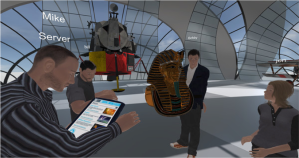By Kevin Gauthier
Generally, most universities conduct to two basic forms of classroom settings: online classes or in-person lectures — however, recent technological developments in the field of virtual reality (VR) have begun to makes these distinctions less clear. Bridging the gap between the two is Engage, a VR service that allows for virtual pedagogy in a more state-of-the-art fashion. What Engage allows you to do, either as a student or an instructor, is participate in virtual lessons in both realm-time and prerecorded sessions through its servers. Currently, this software can be downloaded through Steam for free, though it’s worth noting it’s still in an “early access” stage, meaning it isn’t a completely realized program yet.

Essentially, Engage works through compatible VR headsets and gives students and instructors a virtual classroom to navigate through, along with 3D models available to interact with. Additionally, students have access to a virtual tablet that allows them to upload their own PowerPoint presentations, present a YouTube video, or even navigate through websites by uploading a URL. And of course, there’s an interactive blackboard included as well.

While multimodal components to classroom discourse aren’t necessarily brand new, this certainly begins to deviate from multimodal composition in the classroom to creating a multimodal composition of the classroom. Beyond merely assigning students multimodal projects, students now have the opportunity to present their projects within a virtual, multimodal environment. So who’s to say eventually this won’t be normalized within a typical pedagogical setting? While the current iteration of the software might not provide an equitable substitute for in-person classroom meetings, or perhaps even online courses, there are ways in which Engage compensates for some of the disadvantages of either sort of traditional classroom conduct. In reality, students and instructors alike can “attend” class without ever having to leave the comfort of their homes, yet still experience a meaningful discourse within an academic setting, while engaging with their fellow classmates and instructors more personally than through online forum posts.
